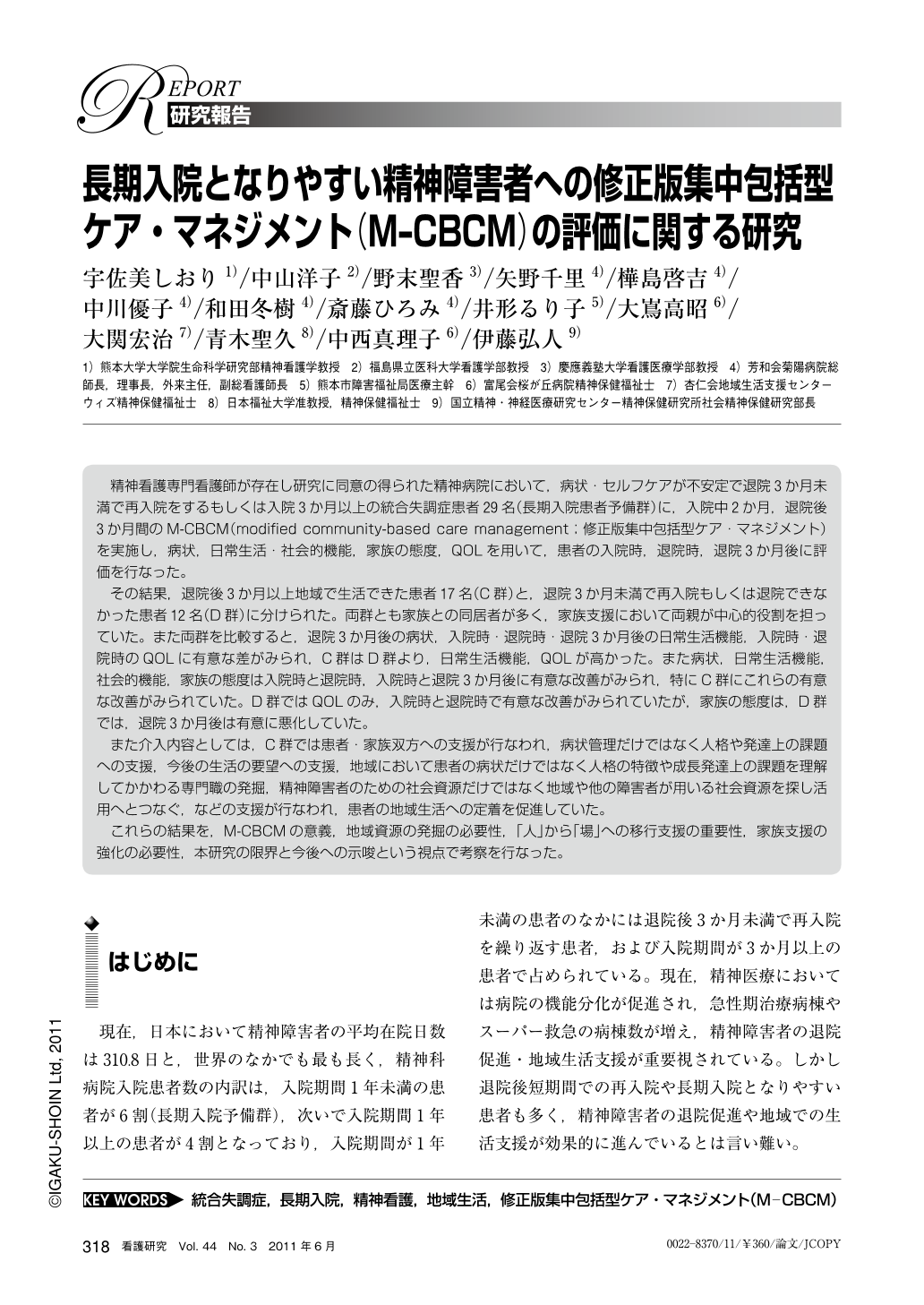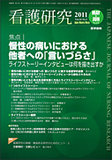Japanese
English
- 有料閲覧
- Abstract 文献概要
- 1ページ目 Look Inside
- 参考文献 Reference
精神看護専門看護師が存在し研究に同意の得られた精神病院において,病状・セルフケアが不安定で退院3か月未満で再入院をするもしくは入院3か月以上の統合失調症患者29名(長期入院患者予備群)に,入院中2か月,退院後3か月間のM-CBCM(modified community-based care management;修正版集中包括型ケア・マネジメント)を実施し,病状,日常生活・社会的機能,家族の態度,QOLを用いて,患者の入院時,退院時,退院3か月後に評価を行なった。
その結果,退院後3か月以上地域で生活できた患者17名(C群)と,退院3か月未満で再入院もしくは退院できなかった患者12名(D群)に分けられた。両群とも家族との同居者が多く,家族支援において両親が中心的役割を担っていた。また両群を比較すると,退院3か月後の病状,入院時・退院時・退院3か月後の日常生活機能,入院時・退院時のQOLに有意な差がみられ,C群はD群より,日常生活機能,QOLが高かった。また病状,日常生活機能,社会的機能,家族の態度は入院時と退院時,入院時と退院3か月後に有意な改善がみられ,特にC群にこれらの有意な改善がみられていた。D群ではQOLのみ,入院時と退院時で有意な改善がみられていたが,家族の態度は,D群では,退院3か月後は有意に悪化していた。
また介入内容としては,C群では患者・家族双方への支援が行なわれ,病状管理だけではなく人格や発達上の課題への支援,今後の生活の要望への支援,地域において患者の病状だけではなく人格の特徴や成長発達上の課題を理解してかかわる専門職の発掘,精神障害者のための社会資源だけではなく地域や他の障害者が用いる社会資源を探し活用へとつなぐ,などの支援が行なわれ,患者の地域生活への定着を促進していた。
これらの結果を,M-CBCMの意義,地域資源の発掘の必要性,「人」から「場」への移行支援の重要性,家族支援の強化の必要性,本研究の限界と今後への示唆という視点で考察を行なった。
This study was conducted with the cooperation of a psychiatric hospital in Kyushu at which M-CBCM was provided to 29 schizophrenic patients from the time of their readmission to three months after discharge.
The patients had been unstable both in their psychiatric symptoms and in self-care management. All were either readmitted within three months of their previous discharge or their hospitalization continued more than three months.
Evaluations were made upon of readmission, discharge, and three months after discharge. Evaluations were based on indexes rating psychiatric symptoms, daily living skills, social functioning, family perceptions of the patient being a burden, and Quality of Life (QOL).
The patients were divided into two groups: 17 patients (Group C) were able to live in the community for more than three months after discharge.
Twelve patients (Group D) were either readmitted within 3 months of discharge or remained hospitalized. Many of the patients of both groups lived with their families, with parents playing the major role in terms of family support.
Significant difference were recognized between two groups regarding the Brief Psychiatric Rating Scale (BPRS), the Life Skills Profile (LSP), and QOL. Furthermore Significant improvements were recognized regarding BPRS, GAF, LSP and FAS at the times of admission, discharge and three month after the discharge.
Family perceptions of the patient being a burden also improved significantly, especially at times of discharge and three months after discharge in Group C.
Group C received support interventions for both patients and their families. Through this it became clear that such interventions were needed, not just for control of symptoms, but for helping patients connect with the community based on an understanding of personality, psychological developmental issues, and desires concerning daily life.
This study led us to the realization that optimum utilization of all the social resources available to the community-including resources for those with disabilities and difficulties and not necessarily tailored for patients with psychiatric disorders-promotes a patient's stable settlement in the community after discharge from the hospital.
For successful (re) integration it is important to find a specialist within the patient's community who has a practical, working understanding of the symptoms and psychosocial developmental issues of the patient.
These results were discussed from a viewpoint acknowledging the significance of M-CBCM, the necessity of finding and utilizing community resources, and the importance of transitional support from “Person-oriented” to “Place-oriented” so as to widen the patient's support base.
Furthermore, with an eye towards future studies, discussions included the necessity of strengthening family support as well as the limitations of this study.

Copyright © 2011, Igaku-Shoin Ltd. All rights reserved.


